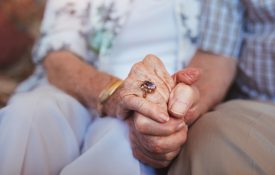-
Artificial intelligence can now predict suicide with remarkable accuracy
Quartz: When someone commits suicide, their family and friends can be left with the heartbreaking and answerless question of what they could have done differently. Colin Walsh, data scientist at Vanderbilt University Medical Center, hopes his work in predicting suicide risk will give people the opportunity to ask “what can I do?” while there’s still a chance to intervene. Walsh and his colleagues have created machine-learning algorithms that predict, with unnerving accuracy, the likelihood that a patient will attempt suicide.
-
You Still Need Your Brain
The New York Times: Most adults recall memorizing the names of rivers or the Pythagorean theorem in school and wondering, “When am I ever gonna use this stuff?” Kids today have a high-profile spokesman. Jonathan Rochelle, the director of Google’s education apps group, said last year at an industry conference that he “cannot answer” why his children should learn the quadratic equation. He wonders why they cannot “ask Google.” If Mr. Rochelle cannot answer his children, I can. Google is good at finding information, but the brain beats it in two essential ways. Champions of Google underestimate how much the meaning of words and sentences changes with context. Consider vocabulary.
-

Spouses’ Daily Responses to Partners’ Pain Linked with Later Functioning
The dynamics of spouses’ daily interactions may influence whether an ill partner’s physical functioning improves over time. Visit Page
-
The ‘Thumbprint Of The Culture’: Implicit Bias And Police Shootings
NPR: On a September evening in 2016, Terence Crutcher's SUV stopped in the middle of a road in Tulsa, Oklahoma. A woman saw him step out of his car. The doors of the car were open and the engine was still running. The woman called 911. Officer Betty Shelby was on her way to an unrelated incident when the call came in. Unfortunately, the way this night ended has become all too familiar. An unarmed black man was shot by a cop. In the weeks after the incident, accusations flew back and forth. Betty Shelby's lawyer tried to defend her fear as reasonable. Terence Crutcher's family said he was shot because he was black. Read the whole story: NPR
-
Self-Harm
BBC: We all experience negative emotions and find different ways to cope – maybe by exercising or by listening to music. But some people deliberately inflict pain on themselves as a way of managing how they feel. Why? Experts believe 15% of adolescents self-injure at least once, with some children as young as 9 using self-injury as a coping mechanism, albeit an unhealthy one. The behaviour can lead to feelings of guilt and distress; family and friends often don’t know how to help. Catherine Carr explores the impact self-harming has on those who do it and those close to them.
-
Health Buzz: Why Being Mean to People Might Actually Help Them in the Future
U.S. News & World Report: Being mean to someone isn't typically seen as something to be proud of – but what if you were doing it in order to help someone else? Though a roundabout way of doing so, people might try and make someone feel bad in a situation where they think it will be helpful to someone in the future, a new study says. Previous studies have found people look to make others feel bad with personal gain in mind, though researchers for this study wanted to find out whether people would do it altruistically. ...

